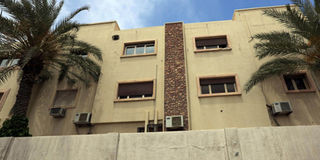Tripoli's liberators become residents' oppressors

PHOTO | MAHMUD TURKIA A picture taken on May 27, 2014 in the capital Tripoli shows bullet impacts on the house of new Libyan Prime Minister Ahmed Miitig after it was attack by armed men overnight. The interim parliament passed a vote of confidence on May 25 in Miitig and his new cabinet, amid rising lawlessness in the North African nation dogged by power struggles between rival former-rebel militias.
What you need to know:
- City that was ultra-safe during Gaddafi’s reign has become a place of fear over constant eruption of fights between competing ex-rebels, say Libyans
TRIPOLI, Friday
Residents of the Libyan capital have complained that the armed groups they hailed as liberators for toppling Muammar Gadaffi have become their oppressors, as opposing alliances back rival governments in their struggle for power.
Tripoli, a city that was ultra-safe during Gadaffi’s four-decade dictatorship has become a place of fear, constantly on tenterhooks for a new eruption of fighting between the competing former rebel militias, many of them from outside Tripoli.
The battle for control of Libya’s oil and gas wealth has intensified as preparations step up for a June 25 general election, with competing caretaker governments laying claim to power, one from the cabinet office, the other from a five-star hotel.
One is backed by Islamists and militia from Libya’s third city Misrata to the east. The other is backed by liberals and fighters from the hill town of Zintan to the southwest.
FROM LIBERATORS TO OPPRESSORS
Those are the same forces that entered Tripoli to scenes of joy in August 2011.
“Not for one moment did we imagine that those who liberated the country would become our oppressors and deprive people of any security,” said Meftah, a 50-year-old teacher who preferred not to give his family name.
“How can you dare to call yourself a liberator when you hold your own people hostage?” He asked.
Meftah complained that the collapse of policing as the rival militias squared off had led to a surge in crime, with gang wars, armed robberies and kidnappings for ransom all on the increase.
“Tripoli is losing its soul and becoming intolerant, this city which was for so long a place of safety where the streets never emptied,” he said.
“People are frightened to go out after dark and our children live in terror of the night time bombings and shootings,” he said.
“For me, the best place to escape is by the sea,” he said, as he cast his fishing line into one of the harbours that dot the capital’s Mediterranean coastline.
FEUDING POLITICIANS
The militias' continued presence in the city nearly three years after Gadaffi’s forces were ousted has not gone without response from Tripolitans.
“We’ve organised a series of protests against the militias and we have had a few small successes,” said activist Iyad bin Omar.
“A few months ago we even organised a general strike and Tripolitans turned out in large numbers to demand that the militias leave the city.
“The militias did pretend to leave to calm people down but in reality most of them just redeployed to other parts of the city.”
Fabric seller Omran said Libya’s feuding politicians needed to draw on the conflict management skills of the country’s powerful tribes who had decades of experience of preventing disputes escalating into deadly vendettas.
“We are a tribal society and the tribes have always managed to strike compromises to settle their differences,” he told AFP in his store in Souk al-Jomaa, one of the capital’s main shopping districts.
“Our politicians are going to have do the same, God willing. They have little experience in crisis management so my advice is that they should call in the councils of elders from the tribes.”
LIFE GOES ON
Daily life does carry on despite the tensions. Banks cut their opening hours this week, but shop shelves remain stocked.
It is the large migrant workforce paid for by the foreign currency reserves built up from Libya’s oil and gas receipts who feel most vulnerable.
In recent weeks, several foreign governments have called on their nationals to leave.
“Libyans are becoming intolerant of expatriates from neighbouring countries and outright racist towards migrants from south of the Sahara,” complained a Moroccan barista who asked not to be identified.
“Their militias say they want to clean Libya up, but this country was built on migrant labour.”
Ten Chadian workers on their way home from Tripoli were gunned down in the southern city of Sebha by men in military uniform, their government said on Thursday.





